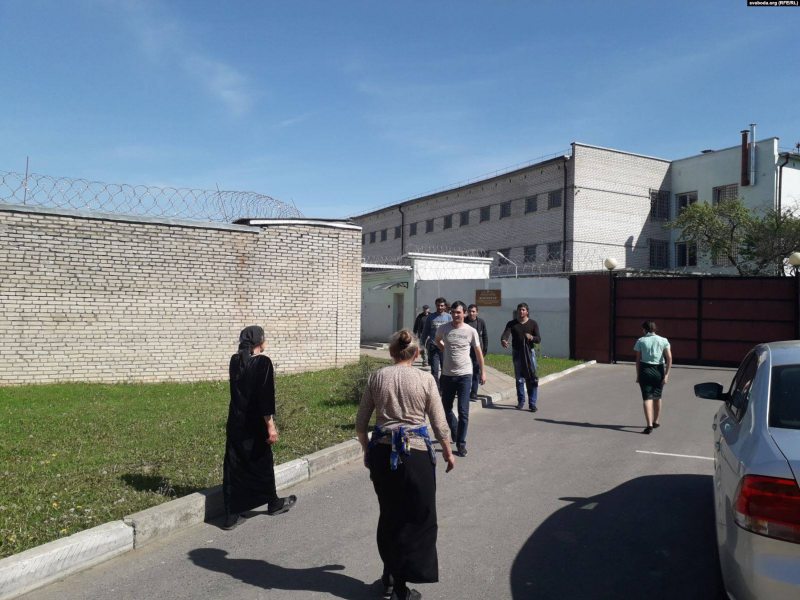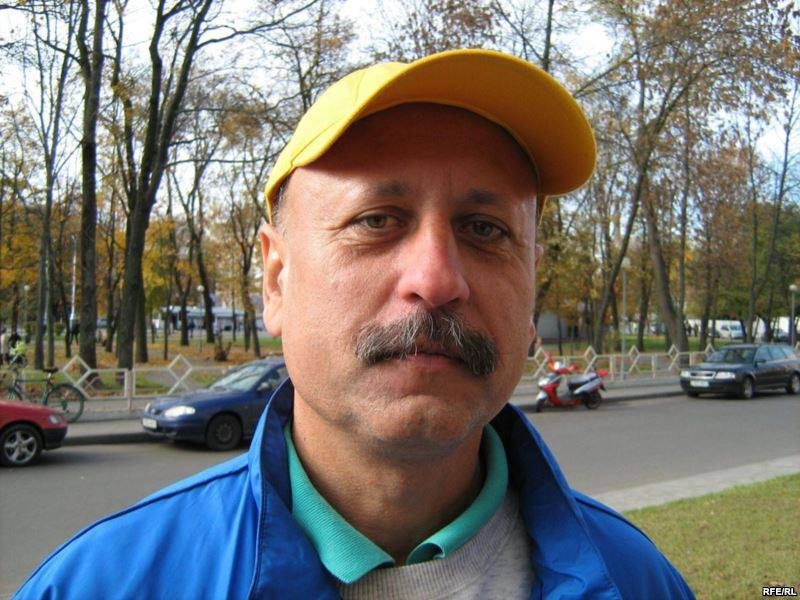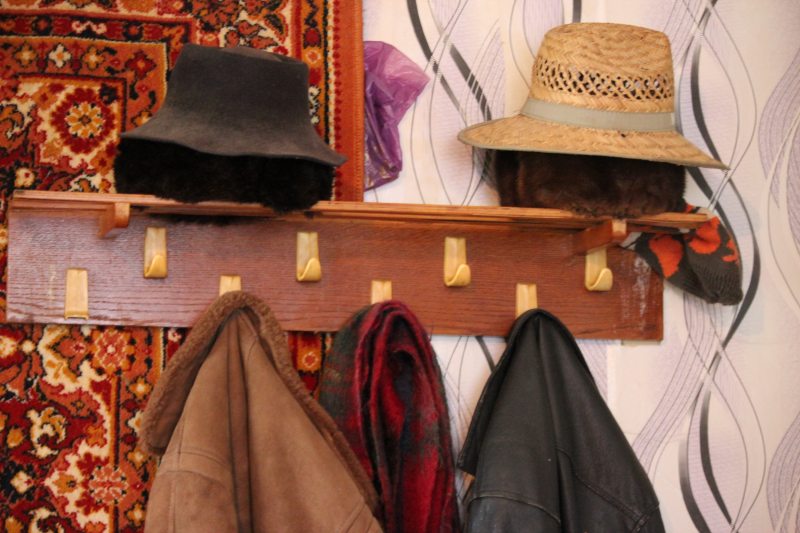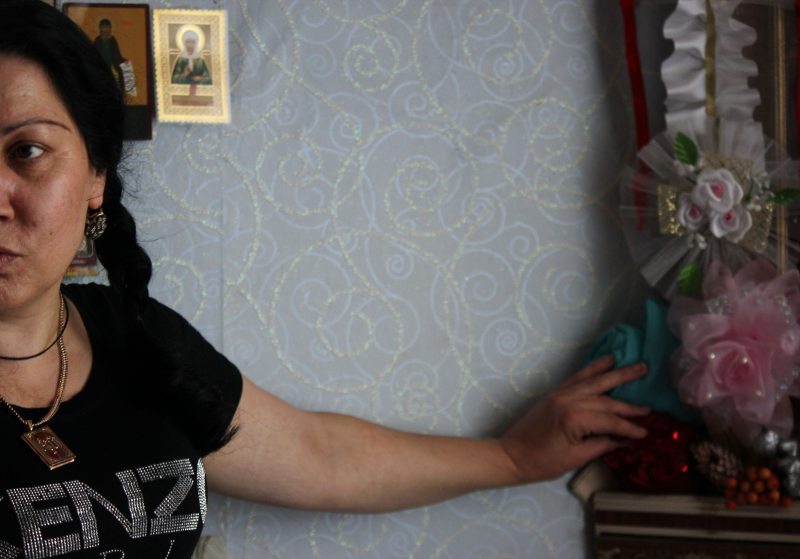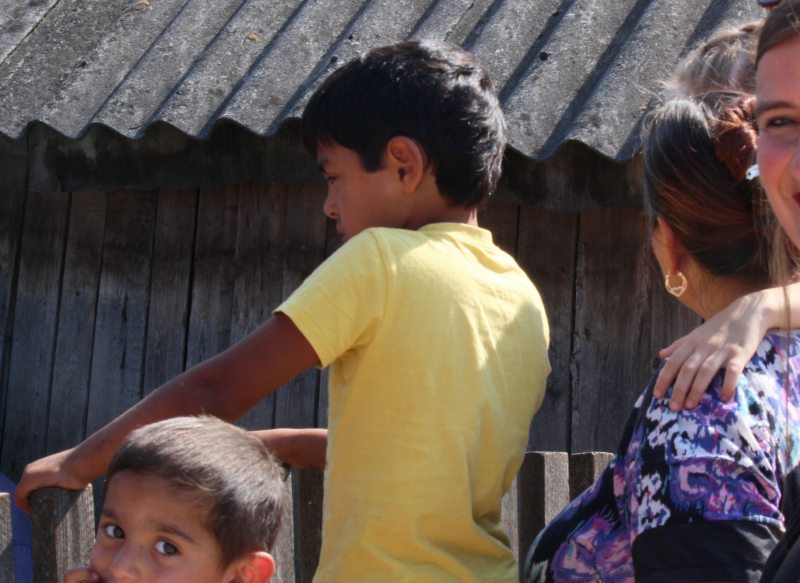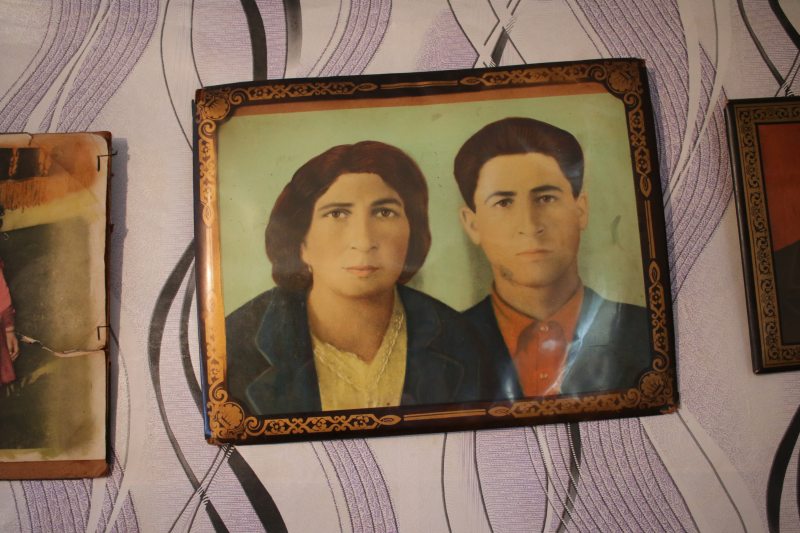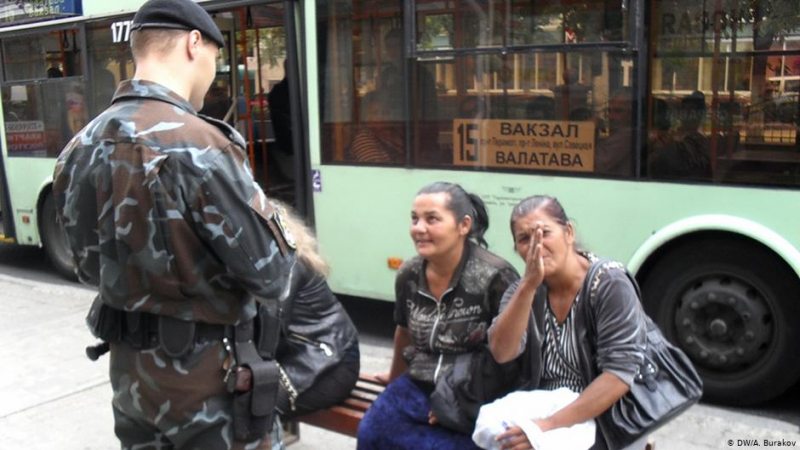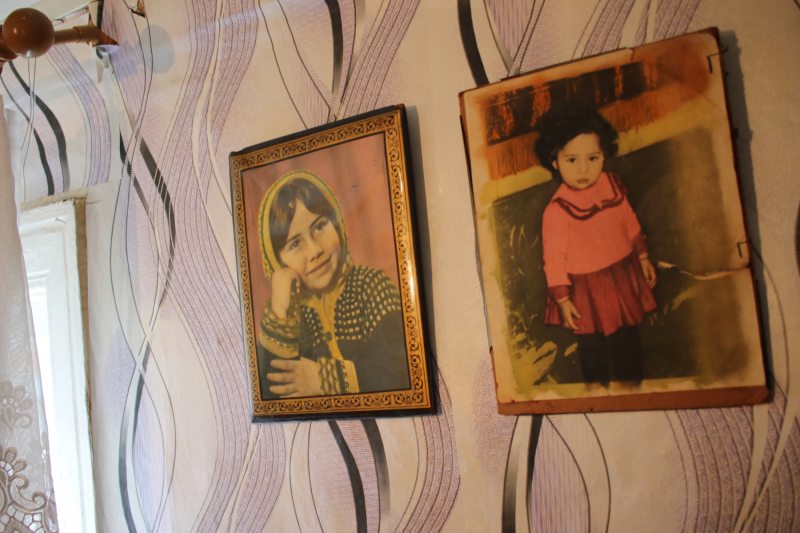The life of the Belarusian Roma: Unvarnished truth Photo
This May, the Human Rights Center “Viasna” wrote about the presentation of a report entitled “Socio-Economic Situation of the Roma Population in Belarus.” Apart from covering demographic questions, the research that was co-authored by the Romaintegration initiative and the Belarusian Roma diaspora, outlined the theme of ethnic profiling of Romani people.
After only two days, police raided dozens of Romani houses in Mahilioŭ, which the Interior Ministry later said was “diligent work”. The human rights activists promptly responded to the roundups by labeling them as “discriminative against the Roma community.”
Aksana, a Roma woman in the town of Sluck, told Viasna that the minority is not welcome anywhere, either among ordinary citizens or by the authorities. She recollects a traumatizing incident when a police officer asked to see her ID at a railway station.
“It was embarrassing. There were other people on the platform, but the police officer picked me. He said it was just an order. He copied my ID details into his notebook and walked away. Then he returned and took out his cell phone to photograph me. And he said, “Thank God you’ve your grandson with you, otherwise you would have gone to the police station.”
It was the only interview in a series of many where the Roma complained about their plight and spoke against the shameful practice that human rights activists call “ethnic profiling.”
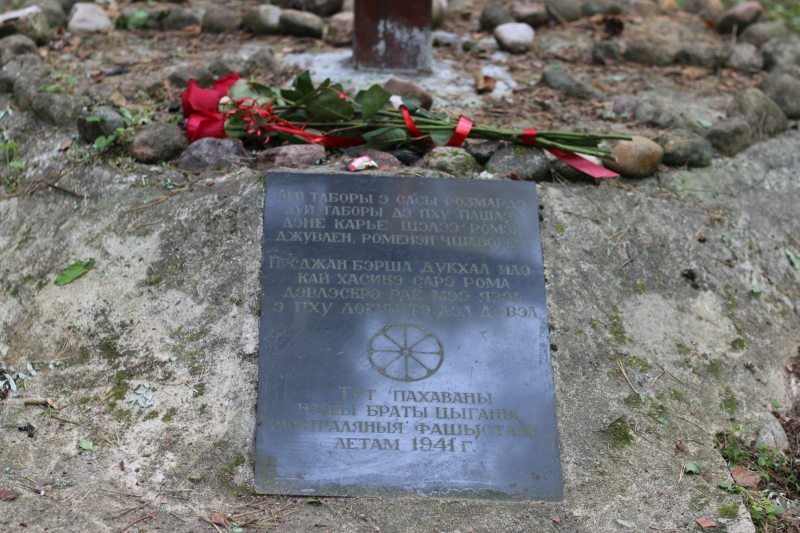
- Monument to the Roma destroyed during World War II. Kaldyčeva, Brest region. Photo: Maria Ulrich / Allegra Schneider
The Roma tend to say that they have no problems, and even, on the contrary, they are fine. Some insist that their lives are no different from those of the rest of the citizens of Belarus while fingerprinting is a “necessary security measure.”
Two weeks ago, nation-wide media reported about the kidnapping of a woman in Homieĺ. She was beaten outside her house and taken in her own car by three youngsters, who were later described as belonging to the Romani minority.
Ales Yauseyenka, an activist working with the Roma people, says he has his own sources inside the community, which usually does not trust strangers, including reporters. According to him, the Homieĺ case is yet another instance of “ethnic profiling.”
A closed community
Ales grew up near an area densely inhabited by the Roma people. He went to the same school and won certain authority among them.
The activist leads an initiative that campaigns for the rights of the ethnic Roma. It consists of several people who, in one way or another, are related to the minority. These connections help the campaigners approach the Roma.
“They all run away in fear. They are afraid that you’ve come after them. The authorities mean trouble to them,” Ales says.
It is because of this fear that the Roma are afraid to talk to reporters.
“They just don’t know how it will be covered, what consequences it will have, what kind of trouble it can bring. They live by the principle “Do not trouble trouble”,” he adds.
Daily life
According to Ales, the Homieĺ region is the most densely populated territory in Belarus. It is home to about half of all Roma in the country. Most often, they live in the suburbs and run an allotment. Having one’s own garden helps put food on the table.
“They live off the land. They have eggs and vegetables. It looks like they are still living in the nineteenth century,” Ales says.
The Roma living in the cities can boast a “satisfactory living standard,” but in the villages, poverty is drastic.
“It is unbelievable that people can be so poor today. Sometimes, there are no doors in the houses and the windows are shielded with cardboard. There’s no electricity, too.”
Extreme poverty is another reason why Roma avoid outsiders since they can have their children taken away by the authorities. As a result, the Roma would flee their settlements, rather than let their kids go to foster parents.
There is a softer option — temporary care in an orphanage. Ales says some Roma women like it because their child is not hungry and sleeps in a clean bed.
There are wealthy Roma families in Homieĺ, too, but they are few.
Employment
Poverty forces some Roma to search for a job. However, discrimination makes the process extremely problematic.
An anonymous interlocutor told Viasna about a woman who was denied employment only because of her ethnicity.
“She was told the job was taken the moment she entered the HR’s office. Twenty minutes later she calls the office and they say it’s vacant again,” the source said.
Many Roma people sell goods at local markets or train stations. They also travel to neighboring villages. But even these simple jobs bring troubles.
“During the Mahilioŭ raids, Roma men in Homieĺ did not go to the markets for work, because they knew the police would have them,” Ales says.
Some men go to earn money in Russia. What they find there is very similar to the Belarusian prejudice against Roma.
“I know some guys who went to work at a construction site in Russia. The employer did not pay them, so they had to return home without any money.”
Roma women often make a living in traditional (and stereotyped) trades: fortunetelling or begging. This increases crime rates among Roma (which feeds the stereotype of the “Gypsy criminality”) since Belarusian laws bear administrative responsibility for “harassing citizens.”
“But they are trapped in such a condition that often there is nothing else they can do. They have to beg. They do not steal. They are only begging,” concludes the activist.
Roma and crime
Ales is sure that Roma people often fall on the criminal path because of their ignorance. They do not understand the boundaries of law and accountability, where their rights end and responsibilities begin, says he.
“For example, there was a boy in the village of Prybar (Homieĺ region) who took his classmate’s smartphone to play. For some reason, he did not return the phone for a couple of days. And the classmate’s parents reported it to the police and a criminal investigation was opened,” says Ales.
Roma and education
Romani children go to local schools. But their modest living conditions inevitably affect education.
“Well, most finish five grades. But in the villages, some drop out of elementary school.”
If a child is a persistent truant, they can be sent to an orphanage, which may eventually result in the deprivation of paternal rights.
Legalization and IDs
Not all Roma have IDs.
“We recently went to the village of Bolshevik. There is a Roma community there, which lives in poverty. We gave them step-by-step instructions in order to get an ID. But when we returned a month later, we saw they hadn’t done anything,” Ales says.
Sometimes, Roma people have no land and house ownership papers, and even birth certificates, since there are many women who give birth at home.
Health care
If there are no IDs, getting medical care is a problem. They can only seek paid help, which Roma rarely do because they cannot afford it. The only option is calling an ambulance. But even emergency assistance may bring problems, Ales says.
“A woman called an ambulance to her small child and he was taken to hospital. The following day, she was approached by a police officer who said that she was suspected of kidnapping that very child only because the kid was fair-skinned. As a result, the woman took her son and escaped from the hospital during the night when the child was beginning to get better.”
Police profiling
The Roma have very complicated relations with the police. Human rights activists have dubbed the situation “ethnic profiling,” and Aksana’s case is one of the many examples of this discriminatory approach.
Sometimes, it seems that the police are too diligent in ascertaining identity. During the situation in Mahilioŭ, many Roma men had to undergo repeated fingerprinting.
Moreover, Roma face expanded registration measures: they have to provide their biological material for a DNA database, and even have their voices recorded.
“The police know that Roma will never complain. That is why they behave this way,” Ales says.
What do the Roma themselves think about a situation of constant pressure from the police? The human rights activist believes that there are two categories of people: the angry and the frightened.
But they will not complain or protest, Ales says.
“Because you get to a separate database, and at the slightest move you are immediately under attack. They know this and try to keep a low profile.”
If you write a complaint, you should be prepared to see unwanted visitors. And the Roma do not need attention. Remember, most are both unemployed and “social parasites”. The house is poor and the children can be taken away.
Solutions?
Although Ales Yauseyenka has spent a lot of time with Roma and knows their problems better than others, he says he cannot come up with a definite solution for the ethnic minority. The activist describes the situation as a vicious circle: lack of education leads to poverty and possible crimes, which in turn contributes to ignorance. Roma are under pressure from the police, but they cannot resist this, as they will face even greater pressure.
Ales believes that joint efforts of human rights defenders with the authorities can help fix the problem. So far, there are none. And even if officials do not publicly use discriminatory language, in fact, “they all have it in their minds.”
As yet, the efforts of human rights defenders cannot even cover charitable support to the community. And helping the Roma with IDs requires lawyers and other professionals.
And, of course, the Roma need to see a different attitude from ordinary people: employers who are afraid to hire them and people with immutable stereotypes about the minority.
“We cannot continue to treat the Roma like that, because they are citizens of the Republic of Belarus, just like all of us. Their IDs do not mention their nationality, as it used to be in the Soviet Union. So why are we so mean to our compatriots? Surely, none will benefit if we lose their culture forever.”




